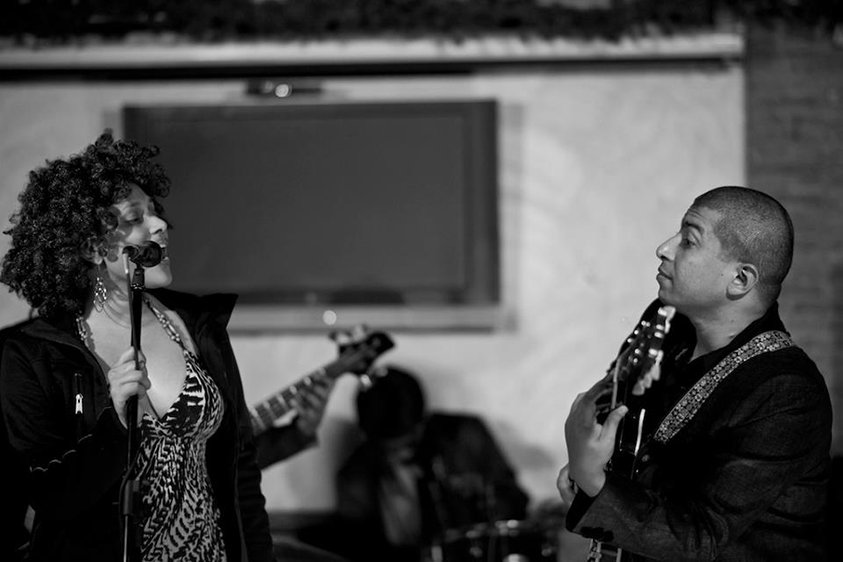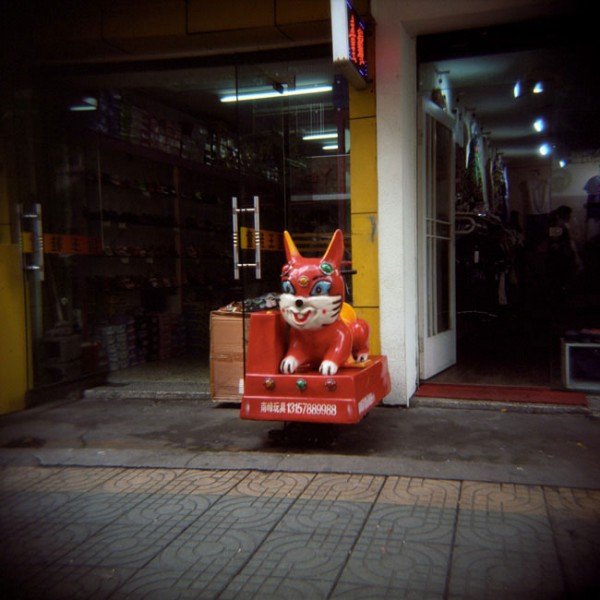India –
Emaho caught up with diabolical duo Adil & Vasundhara – Adil Manuel (Guitar) and Vasundhara Vidalur (Vocals), and talked about their musical stronghold and journey through the world of music.
Emaho : How did the two of you get together? What were your experiences like as a part of bands, prior to meeting each other?
The two of us had mutually exclusive worlds – with one of us (Adil) being a live sessions musician and the other (Vasu) being more of a studio person doing jingles and character voices. We had never heard of each other. A common friend who played bass with Artistes Unlimited, the choir that Vasu was part of, connected us.
It was a matter of 10 minutes of playing a song together and we both knew that this was it.
Our skill sets were very different, and by-and-by we assumed different and complementary roles in running the band.
Adil had been part of bands like Silk Route and had played sessions with Shubha Mudgal ji, Shibani Kashayap etc. He knew the entire mechanism behind gigs. He had already done it for a decade.
I was more into the back end stuff, handling funds, doing all the writing work etc.

Photo Credits : Shiv Ahuja
Emaho : Share with us the moment when the two of you finally said, ‘Yes, this is what Adil & Vasundhara should sound like.’
We never planned what we would sound like. We never wanted to start off with a definition and a box.
There were too many things we loved and there are too many things still left to learn. Our sound would have to evolve with every little change in what we fancied and every new skill we acquired.
Our love for collaboration also necessitates that we leave as much space for those we invite into our space to be themselves. We don’t want definitions to be stumbling blocks.
Emaho : You are a bi-lingual act; performing songs in French and English…..how did French find its place in your music?
We both studied French. We love the language. We are rather rusty now and music is the only way French stays part of our lives. We even have a dedicated project called Funkophonie in which we explore French music and poetry and perform it in our own style.
Emaho : You call your debut album Ampersand, ‘an amalgamation of urban stories in a single version’. Tell us a little about the significance behind the name and the message this record will deliver.
The songs in AMPERSAND are directly about city life, city attitudes, trials and tribulations, city joys … it blends our lived out realities with our fantasies and influences. All our content is autobiographical and includes our comments on the workings and philosophies of a typical Indian city, how it is to be an independent artist — within society and at the margins of a music industry that is still Bolly-dominated.
In terms of the message AMPERSAND wishes to deliver is that we need to embrace that we are hybrid people and hence hybrid musicians. Our Indian-ness is in what we do, what we eat, how we feel, what our spiritual and religious beliefs are, how our families function etc. And yet, for Adil and me, our first language is English and we have grown up listening to, watching, eating and internalizing a mix of all things Indian and non-Indian. The hybridity of our lives reflects clearly in our music. And in doing so, we are being as honest about our ‘roots’ as we could ever be.
Let us not obsess over being more exotic than we actually are.

Photo Credits: Mahima Bhatia
Emaho : Your debut album featured collaborations with some of the finest musicians in the country like Loy Mendosa, Ranjit Barot and Zubin Balaporia from Indus Creed. What was it like having such acclaimed musicians lending you their harmonies and verses?
We were humbled. At first we couldn’t believe that they had been so kind and so supportive. We didn’t know whether to cry or to jump around for joy that the people we had looked up to were actually part of OUR album.
Shantanu Hudlikar had the biggest part to play in this. Songs were sent or played to them and we hoped they would record on them if they felt the songs were good enough. Uncle Louiz was sent Waking Hours and Not Just Another Blues to choose from and he was kind enough to say he would play on BOTH!! We were stunned. Zubin just came in and transformed Creek Funk and Dog days. Sanjay Divecha stunned us all with his wisdom and elegance on the guitar on Dog Days too. Suchet summoned up visuals and landscapes in Refuge and One Winged Goose. We cant forget the morning when Loy came and did his takes. Ranjit Barot created this magnificent beast out of Pinocchio Times. With all their energies, the songs just began to breathe in a different way. There is a lot of kindness and generosity on this album.
Emaho : What was the experience like playing on The Dewarists?
Phenomenal. We couldn’t have been happier with the collaborators they chose for us. Ashwin Srinivasan and Thermal and a Quarter. Our five days together were insane. Our chemistry was fanstastic. Most of all, a great song was born.
What we take back from an exchange like this is really very precious and the relationships that were forged there have endured and we have played together after the Dewarists as well.
Video Credits: The Devarists
Emaho : You have played at many different music festivals around the world, in some of which you have been the first act from India to have been invited. How do you think the Indian music industry is warming up to independent musicians like yourself?
It’s an immense eye opener to play festival and venues abroad. There are some differences between how things work there and how they are in India. We also get to hear great bands whom we might not have had access to at home.
Everyone here wants to start a music festival. And the ones that have been around are getting bigger. Organizers and sponsors think very differently from artists. So we are certain that the response and money being generated are great enough for festivals to become the new formula.
Delhi Jazz Festival, that way, is exemplary. It is free. You see everyone from diplomats, artists and musicians to college kids from outside Delhi in the audience. People bring along picnic baskets and the works, but are clued in to the music throughout. It speaks volumes about where the audiences have reached.

Photo Credits: Shiv Ahuja
Emaho : You are affectionately referred to as the New Jazz & Blues Ambassadors of India. How does it feel having earned that nickname?
Hehe.. heavy.. coz it means that many eyes are fixed on what we do. But it isn’t about us being anything or being called anything. There are a lot of fabulous musicians dedicating themselves to this music and it has got to be about all of us.
For all you know, tomorrow people might lovingly nickname us something really unflattering as well. We just need to be true to what we do.
Emaho : We heard that your collaboration with the two-member audio-visual project from Delhi, B.L.O.T, has influenced you into experimenting with your own take on EDM. Would you like to tell us more?
Emaho : I recorded a song on BLOT’s album, SNAFU and did a few gigs with them as well. I was and still am rather clueless about electronic music. However, my association with Funk and even Swing for that matter is what made the connect. EDM has the same role to play today that Funk and early Swing had in their respective eras… to allow people to dance, let loose and forget their worries.
Besides, BLOT’s gesture of reaching across to musicians to perform their stuff live was really very nice.
Our next experiment will focus not on ape-ing EDM on stage but to play the role that it plays within society today in an entirely ‘Adil & Vasundhara’ way.

Photo Credits: Vijay Kate
Emaho : You got together in 2009 to create a unique sound and have claimed recognition for the same…what would you suggest to other independent artists trying to make their mark in the music scene?
- There are no short cuts.
- There are no wrong decisions when you are clear about what you love.
- There are no rules set in stone for anything in this industry. What works for one band needn’t work for another. So nobody can be an example to anyone else and everyone has his own journey.
Emaho : You have released an album, played at music festivals around the world and collaborated with acclaimed musicians both within and outside India…..what do you see the future holding for you?
More of the same. We love traveling and working with different people.
And of course we’ll keep practicing and learning new things along the way…. So whatever we come up with next will have something new in it.

Photo Credits : Vijay Kate
Art & Culture Interviewed by Aditya Varma
Feature Image Courtesy : Shiv Ahuja















